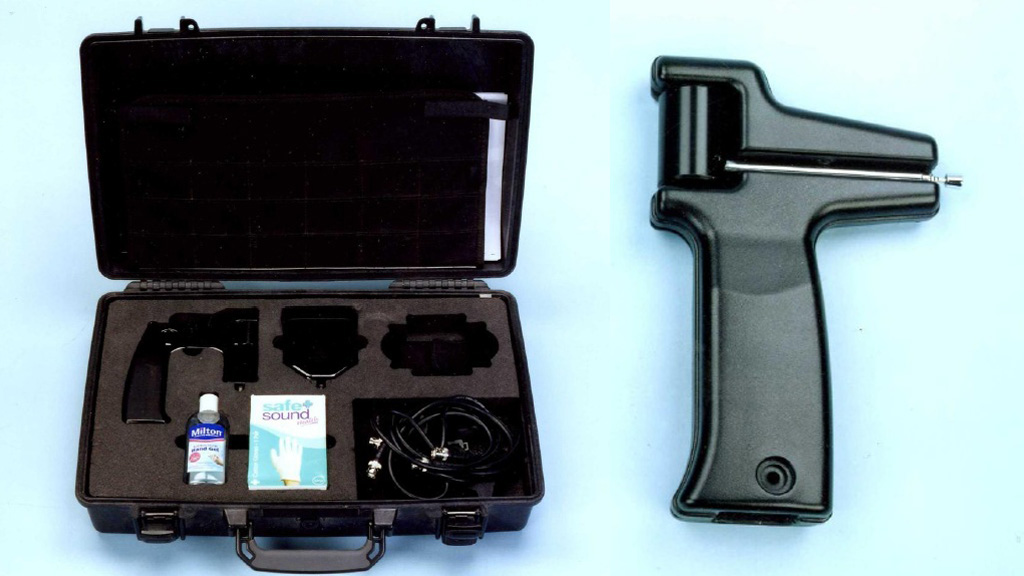Bomb detector businessman facing jail over £50m fraud
Millionaire businessman James McCormick faces jail after being convicted of selling phoney bomb detectors to the military, police forces and government around the world.
McCormick of Langport, Somerset, made an estimated £50m from selling the detectors, which were modelled on a £13 American novelty golf ball finder. Some of the detectors sold for £27,000 each.
His clients included Iraq, Belgium and the United Nations, with the UN planning to use the detectors in the Lebanon. McCormick, 56, is estimated to have made £37m from sales to Iraq alone.
McCormick showed a complete disregard for the safety of those that used and relied upon the device for their own security and protection. Detective Superintendent Nigel Rock
There is no evidence he sold to the Ministry of Defence, a court heard, but an MoD inspector watched a demonstration organised by an Essex policeman.
Criminal enterprise
Detective Superintendent Nigel Rock of Somerset police said: “He sold his detection devices to many governments, defence agencies and private institutions around the world.
“A large proportion of these were countries where there was and still remains a real risk of terrorism and criminality. Iraq was one country which between 2008-10 bought 6,000 devices at a cost in excess of $40m.
The devices did not work and he knew they did not work. Richard Whittam QC
“The devices were used at numerous checkpoints within Iraq during this period. It is clear that both civilians and armed forces personnel were put at significant risk in relying upon this equipment.
“McCormick showed a complete disregard for the safety of those that used and relied upon the device for their own security and protection. He amassed many millions of pounds through his greed and criminal enterprise.”

‘Fantastic claims’
Prosecutor Richard Whittam QC said fantastic claims were made that the detectors could find substances from planes, underwater, underground and through walls.
“The devices did not work and he knew they did not work,” Mr Whittam said. “He had them manufactured so that they could be sold – and despite the fact they did not work, people bought them for a handsome but unwarranted profit.
I never had any negative results from customers. James McCormick
“He made them knowing that they were going to be sold as something that it was claimed was simply fantastic. You may think those claims are incredible.”
The detectors were sold using glossy brochures and the internet, where men dressed in military-type fatigues were shown using the detectors to find explosives, drugs and people.
Items could be detected up to 0.6 miles underground, up to three miles from the air and 100ft underwater, it was said.
Global sales
McCormick, a former policeman and salesman, told the court that his detectors had been sold to police in Kenya, the prison service in Hong Kong, the army in Egypt and border control in Thailand.
He also said one of the devices had been used to check a hotel in Romania before the visit of an American president in the 90s. He said: “I never had any negative results from customers.”
After his arrest, McCormick said he had heard of the technology in 1994 and had reinvented it for the handheld device.
However, Mr Whittam told the court, experts found one of the devices, the ADE 651 (pictured above), “lacks any grounding in science, nor does it work in accordance with the known laws of physics… completely ineffectual as a piece of detection equipment”.
It was no better than trying to detect explosives at random, said Mr Whittam.
The devices were sold by McCormick and his companies along with training and “sensor cards”, the court heard.
McCormick also used an International Association of Bomb Technicians and Investigators’ logo which he was not entitled to use, the court heard.
McCormick shook his head as verdicts finding him guilty on three counts of fraud were delivered. He was remanded on conditional bail to be sentenced on 2 May.
-
Latest news
-
Taylor Swift’s new break-up album breaks records3m

-
NHS trust fined £200K for failings that led to death of two mental health patients3m

-
Sunak vows to end UK ‘sick note culture’ with benefit reform3m

-
‘Loose talk about using nuclear weapons is irresponsible and unacceptable’, says head of UN’s nuclear watchdog3m

-
‘There wasn’t an Israeli attack on Iran,’ says former adviser to Iran’s nuclear negotiations team7m

-




